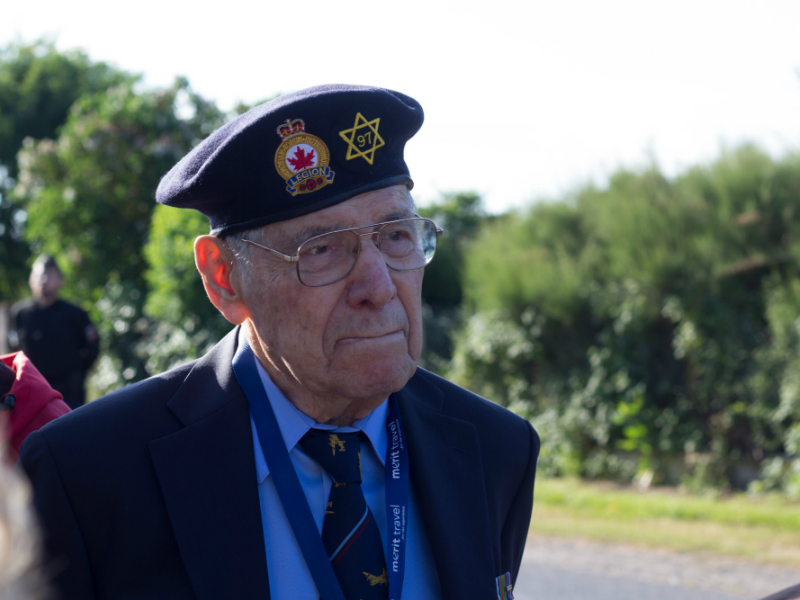Tell Bill to wear his medals tomorrow,” Vita Novick whispered to me in the lobby of our Portsmouth, England, hotel earlier this month. Nearby, her husband, Montrealer Bill Novick, a decorated Canadian Second World War veteran, stood in line waiting to check in. The couple was en route to Normandy for the 75th anniversary of D-Day, but the humble physician’s only visible sign of being a living war hero, at age 95, was the blue Royal Canadian Air Force ball cap he sported.
Despite the staggeringly high casualty rate for Allied airmen who served with the Royal Air Force’s Bomber Command during the war (50 per cent of the crews did not survive), Novick completed 35 missions over German-occupied Europe and kept his entire seven-man crew safe. For his careful and consistent piloting of Halifax bombers in 1944, including on D-Day itself, Novick was awarded the Distinguished Flying Cross in 1945.
Yet he insisted he was there to pay homage to the 14,000 Canadian infantry soldiers who stormed the French coast on D-Day. “They had a lot worse problems than I ever faced,” Novick said.
This was Novick’s third D-Day anniversary trip since 2004, but was the first time some of his adult children and grandchildren came along. “It’s been a really moving experience,” said Jason Novick, 30, of Calgary, who sat with his grandfather in the front row at the official Canadian ceremony on Juno Beach.
READ: BESSNER: A TRIBUTE TO THE “ANGEL OF THE BATTLEFIELD”
Watching from the public area was Canadian-born philanthropist Jonathan D. Fischer, who spent a gruelling week cycling across Normandy. Fischer, who now lives in Los Angeles, logged 700 kilometres on two wheels during the Wounded Warriors Canada Battlefield Bike Ride 2019 charity event. It raised $700,000 for veterans with post-traumatic stress disorder.
Fischer’s father, Rafael Erwin Fischer, survived the Nazi invasion of his native Vienna, escaping as a teenager to England, where he later enlisted with the British army. He would move to Ontario in the 1950s and start a family, but he didn’t talk much about the war. “We had to pry it out of him,” Jonathan Fischer said.
Further up the beach, father and son duo Dylan and Howard Jacobs wore matching blue blazers, grey pants and shoes. Dylan Jacobs also sported a tie belonging to his late grandfather, Toronto Jewish war veteran Murray Jacobs, who died in 2015.
Dylan Jacobs, 21, choked back tears as he held a large portrait of his grandfather. “There is not a day that goes by that I don’t think about what he did, and the way he did it as a proud Jewish man – not just for me but for all of us to be able to stand here today, proud, safe and welcomed in this world,” he said. His grandfather served in France, Belgium and Holland, and helped invent the armoured personnel carrier during the battles for Falaise in August 1944.
Murray Jacobs also battled anti-Semitism from men wearing the same Canadian uniform. So did Ed Fitch’s father. Fitch, a retired major general with the Canadian Army, came to Juno Beach from Victoria, to see where his late father, Burton, landed in 1944. “I picked up some pebbles and they will be on his headstone in Victoria,” Fitch promised, his eyes filling with tears.
Jack Faibish was motivated to enlist in the Canadian Army in September 1939, while living in a Saskatchewan farming hamlet populated by German sympathizers. His relative, Gayle Kwinter, a retired Toronto teacher, came to France to visit his grave and to say Kaddish. She and her husband found Faibish’s tombstone in the Bretteville sur Laize Canadian War Cemetery, southeast of Juno Beach.
“I brought a yahrzeit candle,” she said. “It was very emotional.”
After Bill Novick’s discharge in 1945, he enrolled in medical school at Queen’s University in Kingston, Ont., but then interrupted his studies to take up arms as a Machal volunteer during Israel’s War of Independence. Novick returned to Israel last year for the 70th anniversary. The idea to come to Normandy came together during Novick’s 95th birthday party last December. As his family gathered, he realized his descendants were interested in what he lived through back when he was slightly younger than they are now.
“It’s important that they understand what I did, what my generation was called upon to do,” he said. “They are lucky they aren’t called on to do the same thing.”
Daniel Novick, 27, of Toronto, helped set up a computer link, so that a CBC reporter in Toronto could interview his grandfather live from aboard a ferry crossing the English Channel. “Make sure to smile,” Daniel Novick reminded his grandfather. Daniel Novick remembers seeing the Distinguished Flying Cross medal hanging on the basement wall in his grandparents’ St. Laurent, Que., home. That’s where Novick’s RCAF flight log book is stored, along with lots of memorabilia.
But Bill Novick, who still practices medicine, is too busy to dwell on that time. He only wore his medals, along with his Jewish war veteran beret, for the official D-Day ceremony. The next day, he was back in civilian clothes. “I really am not comfortable with too much attention,” he explained.
Even Novick’s wife, Vita, didn’t always know how he earned his bravery medal. Before they were married in 1953, she said, “He told me he pulled his boys out of a burning brothel.”
